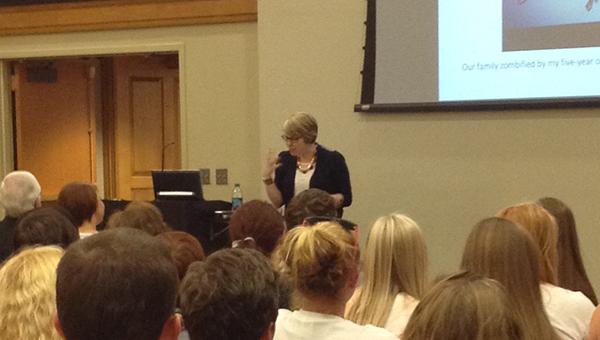Day, a graduate of The University of Alabama in 2008, died unexpectedly July 21, 2011, at the age of 26. In 2012 his father, Charles Day, and stepmother, Nancy Campbell, established an annual lecture in the department of religious studies to honor his memory.
“He was very much interested in popular culture and religion, science fiction and religion and comic books, ” said Russell McCutcheon, department chair of religious studies. “So each year we choose a speaker and topic that would be something that Zachary would have been interested in.”
McCutcheon said last year at the inaugural lecture a scholar came to talk about hip-hop and its influences on religion and pop culture.
This year, Kelly J. Baker, a freelance writer and author, spoke about zombies, the apocalypse and her new book, “The Zombies Are Coming! The Realities of the Zombie Apocalypse in American Culture.”
Baker is interested in the American fascination with zombies and how it has been such a huge influence on books, movies and even conspiracy theories.
“Zombies are truly the cultural monster of the moment,” she said.
As a religious scholar, Baker explores the fantasy of zombie apocalypses and why it’s so prominent right now.
Baker talked about the 1968 original zombie movie “The Night of the Living Dead” and said the movie introduced the threat of “things,” or zombies.
“The underlying message in this movie is that real world problems such as racism and betrayal wouldn’t go away in an apocalyptic world,” she said.
Baker also referenced “Warm Bodies,” which features a rare concept in zombie films – there is finally hope in the end.
“What I personally like about [“Warm Bodies”] is the zombie is no longer an insatiable monster,” she said.
Baker said, when looking at these underlying meanings, people learn humans may be the monsters after all.
“We learn that no matter how dangerous monsters are, humans are the true danger,” she said.
Merinda Simmons, professor of religious studies, said the lecture did a great job honoring the memory of Zach Day.
“Overall I hope that the people who came to this event will see that scholars of religion aren’t people who just talk about dusty old books and monasteries,” McCutcheon said.









